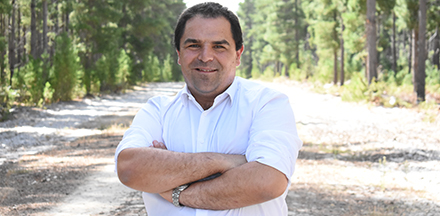Rural Liberal MPs have told Scott Morrison to ban companies from buying agricultural land purely for turning it into a carbon sink, warning that farmers risked being outbid by fossil fuel giants seeking to offset their emissions. Source: The Australian
As the Prime Minister headed overseas on Thursday night for international climate change talks, Liberal MP Tony Pasin said there was “real and active concern from rural Liberals” that big business would exploit the government’s plan to massively expand the carbon farming sector.
Mr Pasin, from the rural South Australian seat of Barker which includes the Green Triangle timber region, said he had been given assurances by the government’s leadership team that there would be regulations to “prevent the purchase of farming properties to operate as unproductive carbon sinks”.
“We have received a commitment from the leadership team that we will work to ensure that the methodologies and protocols adopted will prevent that activity from occurring,” Mr Pasin told The Australian.
“We are actively seeing it take place in Australia. There was a purchase by Woodside in Western Australia recently for this purpose, and recently we have seen the NSW state government acquire a property for a number of reasons including the potential to operate it as a carbon sink.
“Some of the world’s largest emitters operate in Australia, gas exporters et cetera, and they have very deep pockets that are able to outbid farming enterprises.
“The last thing we want is a patchwork of dormant agricultural assets across the country.”
Woodside Petroleum has purchased more than 10,000ha of farmland in the past two years as part of a tree planting program to partially offset emissions from its oil and gas production.
The government’s low emissions plan released on Tuesday identifies carbon farming as a critical component of Australia being able to reach a net-zero emissions target by 2050.
The plan also involves giving farmers credits worth about $25 for each tonne of carbon stored on their property through the planting of trees on unproductive land and using special soil that stores the element.
Mr Morrison will spend two days in Rome for G20 talks before heading to Glasgow to commit Australia to his net-zero emissions by 2050 target at a UN climate change conference.
With the government coming under pressure from international leaders to update its 2030 target, Mr Morrison said he would make no apologies for taking a uniquely Australian plan to the summit.
The government’s 2030 target to reduce emissions by 26-28 of 2005 levels is well below that of most comparable nations, including the US and Britain, although Mr Morrison will tell the Glasgow summit, he expects Australia’s emissions to be 35% lower by 2030.
Setting the scene for an election battle on 2030 targets, Mr Morrison said raising the medium-term commitment would force taxes and regulations onto Australians.
“On the issue of 2050 versus 2030, this is a very important point, and that is that the technology that you need … has long lead times and you need to put the resources in now for things that could take 10 or even 20 years,” Mr Morrison said.
As Labor hounded the government over its refusal to release modelling of its plan ahead of Glasgow, department officials admitted the information was still in a “spreadsheet format”.
Department of Industry Science Energy and Resources deputy secretary Jo Evans said, while the substantive modelling work had been completed, it still needed to be translated into a comprehensible form.
In further disharmony between the Nationals and Liberals, Mr Morrison contradicted Barnaby Joyce’s claim the junior Coalition party forced the government to reject a US and European-backed pledge for a 30% cut in methane emissions by the end of the decade.
“We never had any plans to sign up to that,” Mr Morrison said.








